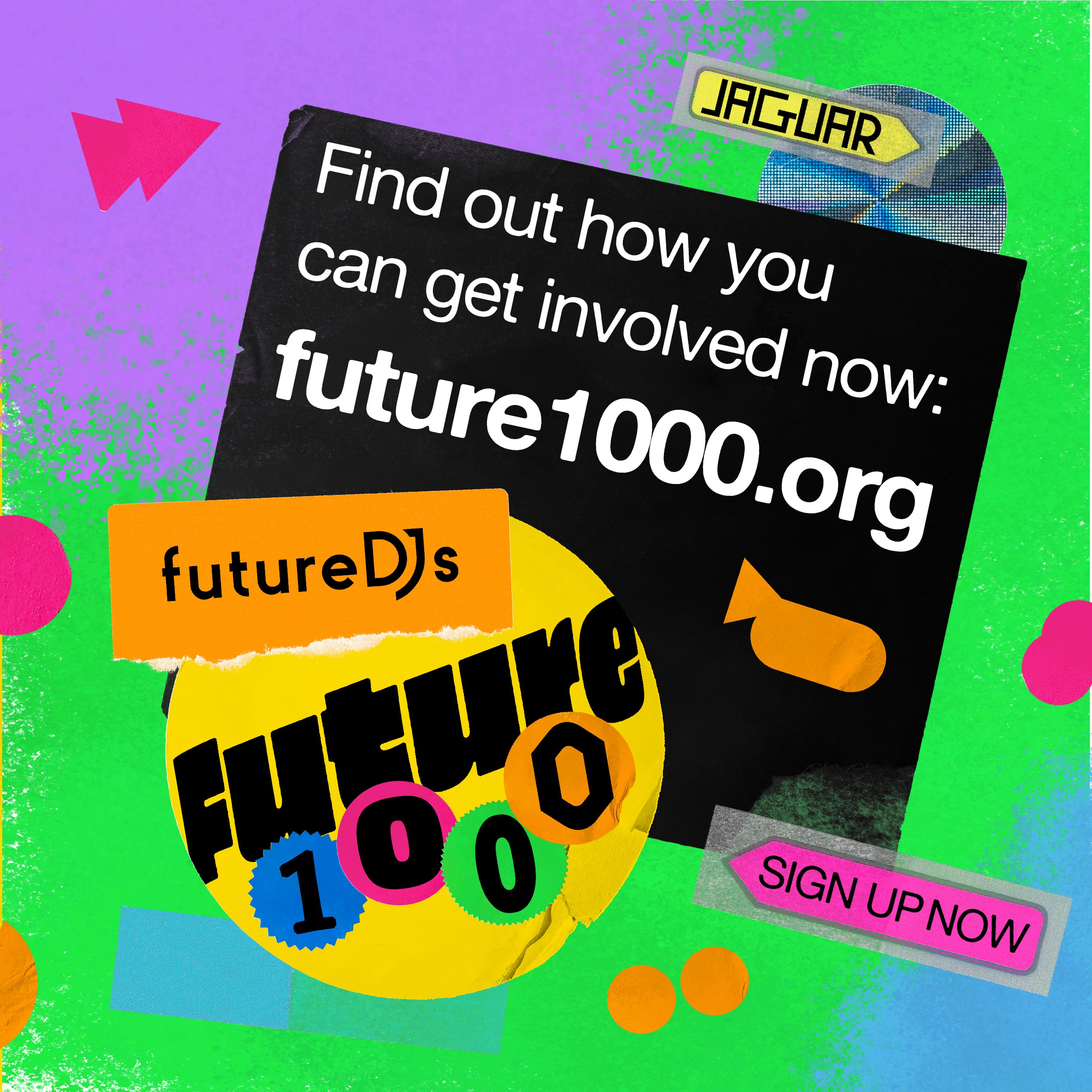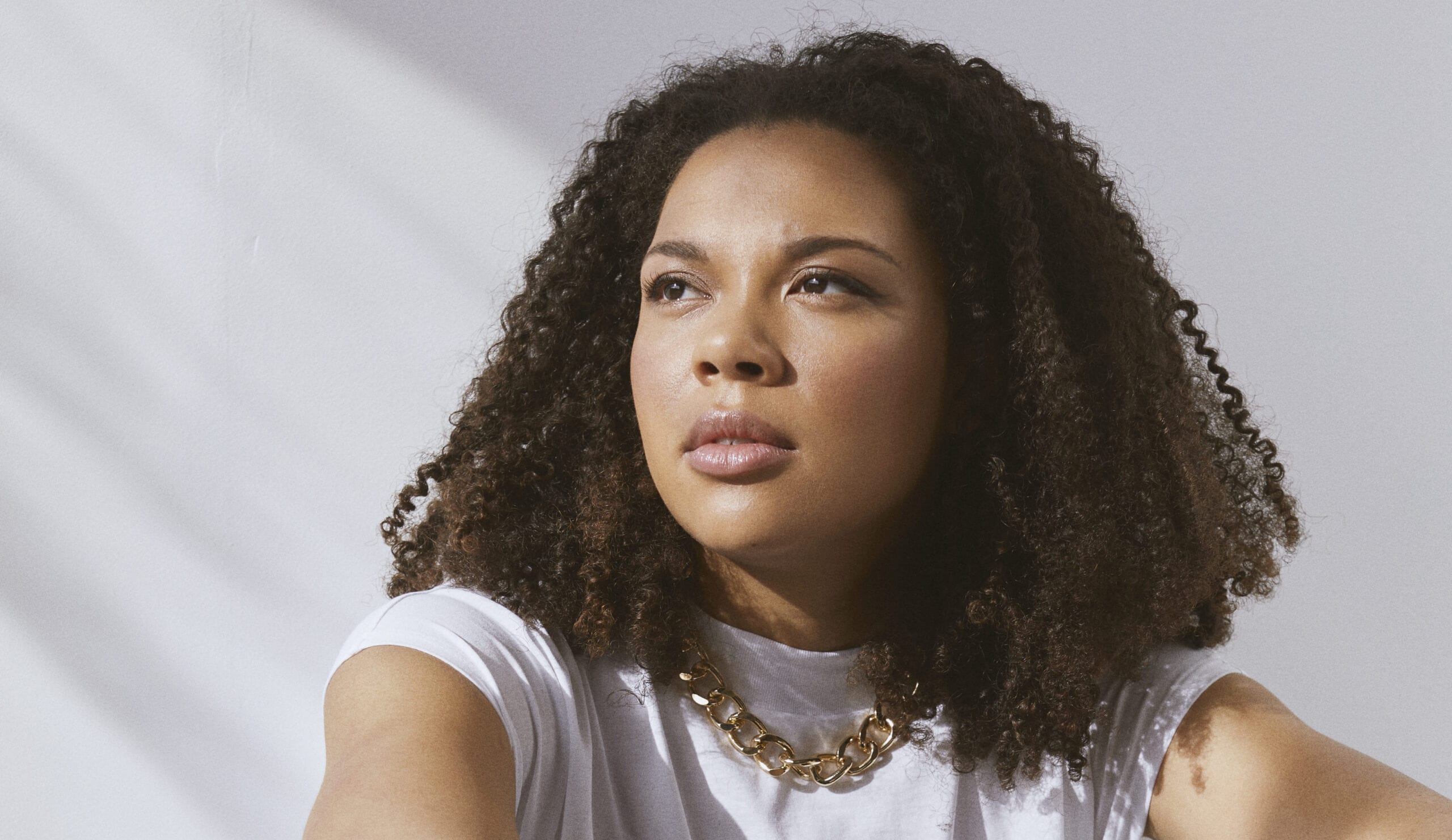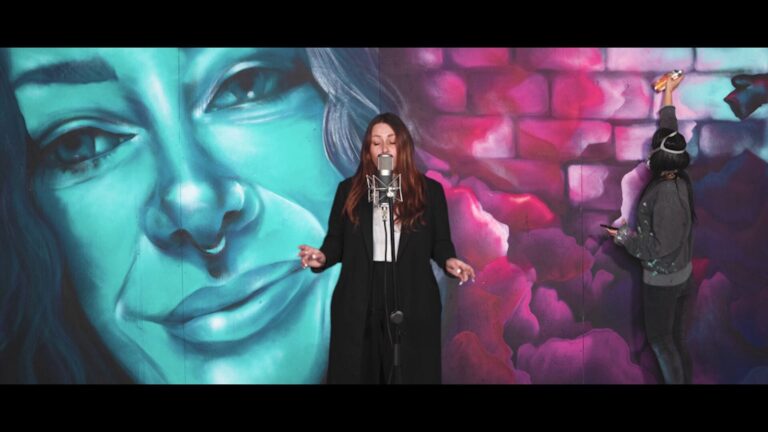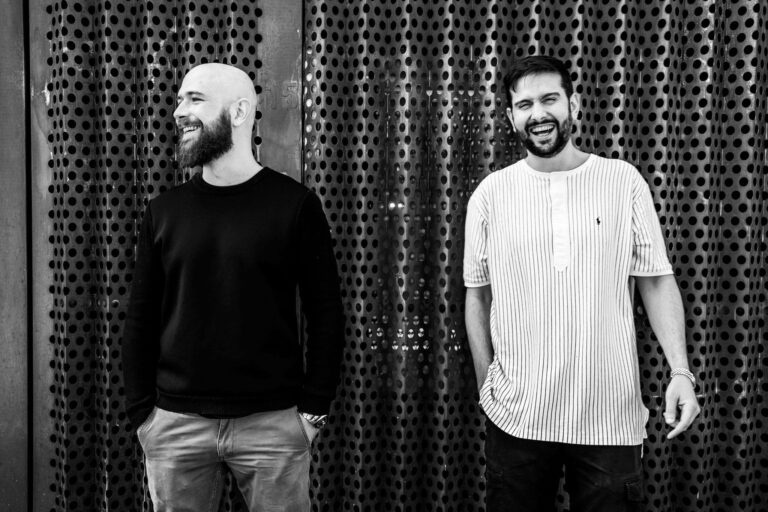Photography: David Reece
Last month was a pivotal one for BBC Radio 1’s DJ Jaguar as she launched her first initiative: Future1000, a free UK-wide training programme aimed to empower young women, trans and non-binary music makers and encourage them into the studio.
A collaboration with the FutureDJs organisation – who have successfully provided guidance and infrastructure to UK schools to allow DJing to be recognised in music GCSEs – Future1000 will recruit 1000 girls, trans or non-binary people aged 12-18 for a 12 week course that covers a wide range of industry areas from music production to broadcasting to management.
With a range of artist-led sessions and modules developed by London College Of Music Education, Future1000 addresses the gender imbalance across the industry at a grassroots level.
“Our hope for equality lies in the next generation and that’s why Future1000 will help improve gender diversity and representation at the very start of young people’s journeys into music, at a time when access to opportunities and inclusivity is most critical,” explains Jaguar who has previously encouraged change and progressives discussions with her UTOPIA Talks podcast and has recently launched The Jaguar Foundation for future initiatives. She joined Radio 1 in 2019 and last year became the host of BBC Introducing Dance. Recently she was also one of the very first DJs in the UK to play at a full-cap, non-socially distanced crowd at Liverpool’s now-historic ‘test rave’ and was one of the many talents playing in Leeds last weekend for Radio 1’s Big Weekend.
We caught up with her to find out more about Future1000 and how students and schools can get involved…
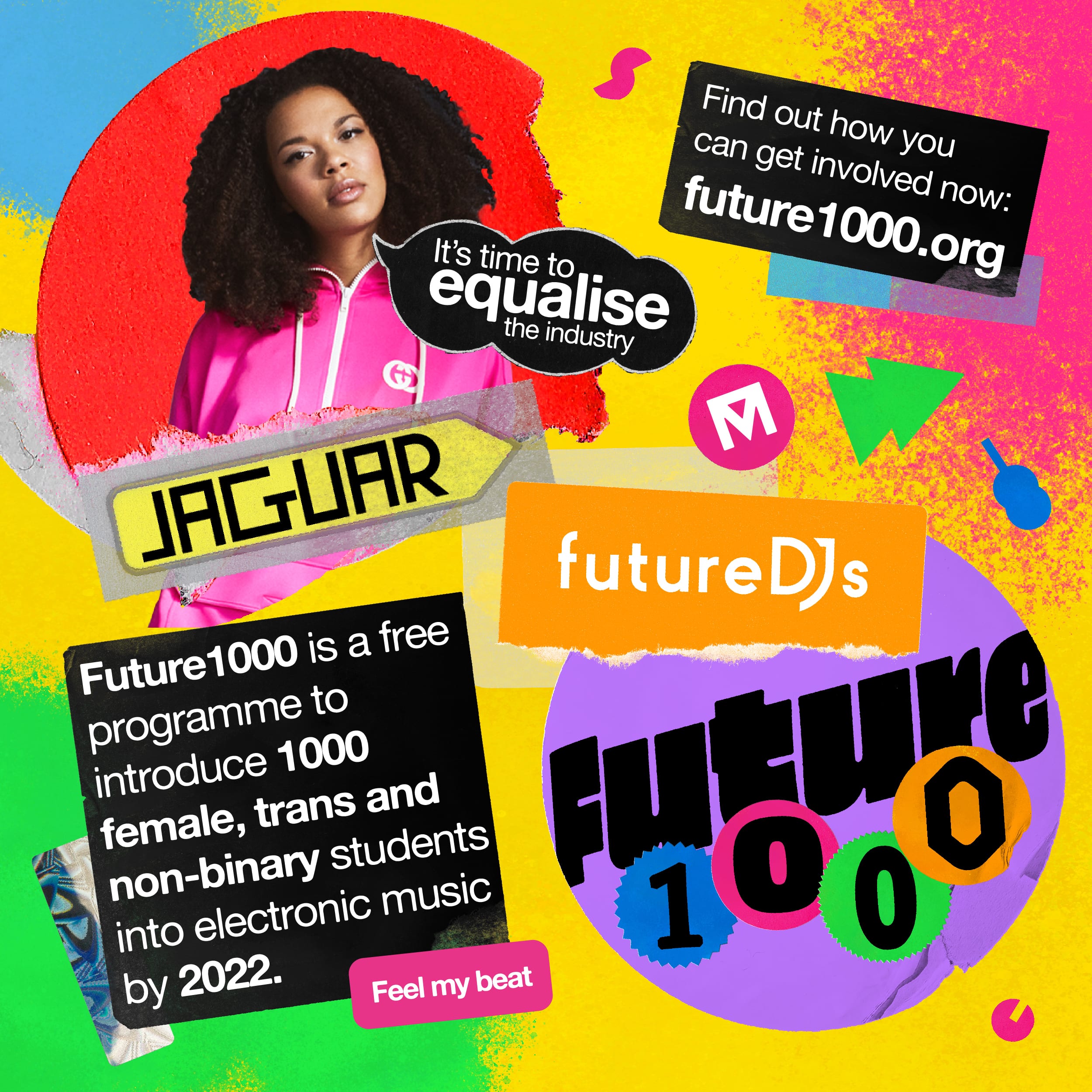
Firstly, how was your set in that test rave in Liverpool?? That was a historical moment!
The whole experience was unreal! I was a bit apprehensive at first, just because it felt weird to be around so many people, not socially distancing, but I soon got back into the raving spirit. Loved playing back to back with Heidi, our styles were well suited and we just had the most fun up there. It was a very emotional day, and I’m so honoured to be a part of history.
Sick. How are things at Radio 1? You sound like you’re having a ball!
Radio 1 is great! I’m still pinching myself daily about having a show, and I’m so grateful! We recently celebrated the first birthday of my show BBC Introducing Dance, which is a platform for showcasing and discovering emerging producers and DJs from around the UK who have uploaded their music to BBC Music Introducing. I’ve been having the best time, and putting the show together is the highlight of my week. This show launched in lockdown, and I’ve been recording it from home, and it’s amazing to see the community that’s grown around it from the new artists I’m playing on the radio. I feel like it couldn’t have come at a better time, as during the pandemic artists, especially new artists really suffered, but then suddenly they had a home to be played on national radio, and I really cherish that responsibility.
In September the show’s moving to Thursdays at 10pm, which I couldn’t be happier about! I can’t wait to discover even more artists and help break them on Radio 1, it’s gunna be great!
So about Future1000. It’s such an awesome initiative. How did it come about?
I came up with the idea at the end of last year, after I hosted my virtual conference to empower new artists called UTOPIA Talks (an offshoot from my UTOPIA parties) with FutureDJs, who do loads of work with music education in schools. I loved the experience and noticed that the conference attendees were 50/50 male and female, which I LOVED! I wanted to then do something more to help achieve gender equality in dance music, and thought about my experiences as a woman coming up in a male dominated industry, and we pitched the idea to FutureDJs about hosting a course for young girls, trans, and non-binary people aged 12-18, and Future1000 was born!
It’s a free, online 12-part course where you can learn to DJ, produce music with a great software called Soundtrap, host radio shows and learn the inner-workings of how the industry works. If you look at the stats, 3% of producers are women, and 16% of all artists are women, which is so poor. It can feel intimidating being a minority, and so the point of the course is to encourage girls, trans and non-binary people to follow their curiosities and try something new which I hope will inspire them to want to enter the music industry as careers.
I also wanted to do this because when curating my radio shows I try to make the gender balance as close to 50/50 as possible. It has been challenging at times, due to there being much fewer female and gender minority producers, so Future1000 is one way I’m trying to solve this issue.
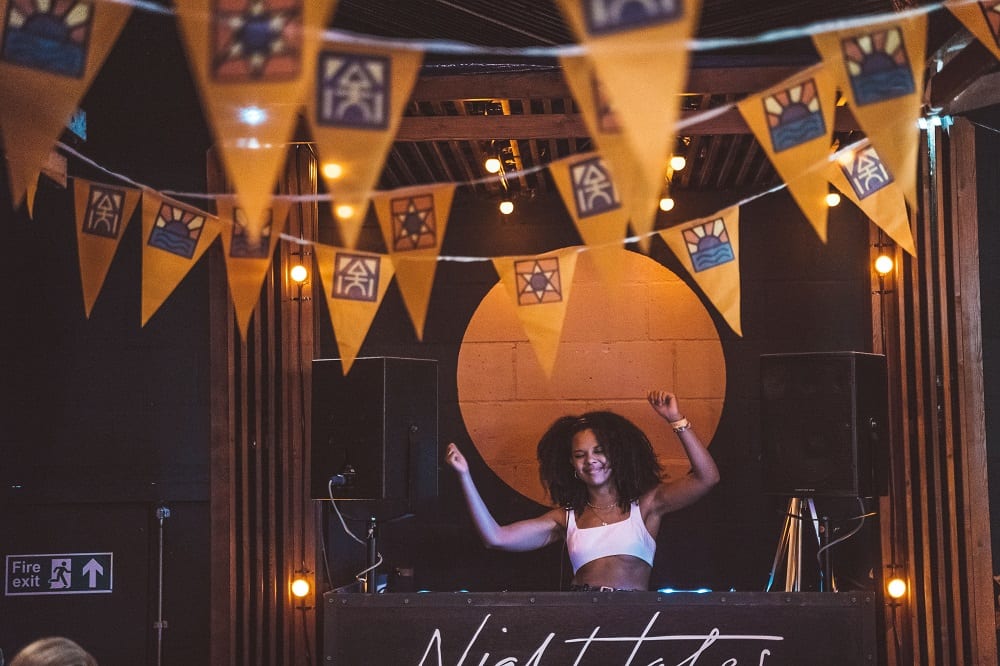
Redressing things at grass roots is definitely the best way to change the imbalance at a generational level isn’t it?
Absolutely. This is about empowering the next generation and helping them see what’s out there at an age that’s so key. I think back to when I was a teenager and you have so much pressure on you to decide what you want to do! If I had known about DJing and hosting radio shows earlier, I would have jumped at the chance to get involved. It’s also about showing these young girls, trans and non-binary people that they have a space in dance music, and I hope they can look at me and the guests who’ll join us on the course and felt seen and represented.
What type of access to studio or musical equipment did you have when you were in school?
I was lucky to have a music department at school, and I had a brief stint at singing in the choir and playing piano and later the oboe for a few years… But I was never going to be the best musician, or anything like that, and my school’s focus was on academic subjects, so I was never encouraged to pursue music, or consider it as a field I could go into. Looking back, I would have loved to have done a GCSE in music but I didn’t have the confidence to vocalise this. It was when I went to uni and had a go at student radio, where I realised that this was the world I wanted to be involved in.
Besides encouraging schools to work with FutureDJs to create this access, what other tips or advice do you have for female and gender minority DJs and producers to get into the industry?
I would say, don’t panic if you don’t know what you want to do! It’s a journey and there’s no rush. Follow your passions and do the things you enjoy, because it could become your job and it won’t feel like work at all!
Please big up FutureDJs. They were a huge part of getting DJing recognised as a music GSCE instrument. This initiative is another level isn’t it?
FutureDJs are fantastic to work with and are doing so much to reshape how students are learning music at school. Because of them you can now get a GCSE in DJing which is mad, and I know I would have LOVED that at school! They make music education accessible and modern which is so important, especially in a time where students haven’t been at school as much with restrictions from the pandemic. Working with them feels like the perfect collab with Future1000 and together we’re making music accessible.
This is really important to you isn’t it? Can you shed light on any future initiatives?
Helping people and giving them opportunities is basically my ethos within everything I do, from the artists I book for my events, to the acts I’m supporting on my radio shows. I’ve been incredibly lucky to be where I’m at, and have be on this journey in my career. I love extending any knowledge or support to other artists and help them on their way, especially other women! I’ve had some great support from women in our industry like Annie Mac and The Blessed Madonna and I want to continue opening doors for people.
I recently announced the launch of The Jaguar Foundation, which will be a home for future initiatives like Future1000. During the pandemic I’ve learnt the importance of using my voice for good and I want to continue doing this work throughout my career. Stay tuned for more projects like this in the future!
Dance music has undergone a positive and progressive shift during lockdown with so many artists and brands and organisations raising loads of money for all kinds of initiatives and charities. Dropping egos and putting other people first, basically! Have you noticed this shift over the last year or so?
Definitely! As I said before, we’re learning to use our voices in the dance music scene – whether it’s talking about civil rights in line with BLM, or speaking out about sexual abuse in club culture and saying ‘actually, it’s isn’t okay to turn a blind eye to male DJs’ behaviour’, we have a duty to support what matters to us. Covid levelled the playing field – no matter where you were on the career ladder, we are all in the same boat, and now it’s the people who really care about our scene and making the world a better place that are being noticed, and for the right reasons!
Amen. Finally, if someone reading this wants to work with Future1000 with their school, how do they make it happen?
Head to our website! Future1000.org. If you’re a student, you need to be nominated by your teacher and then you’ll be added to the course. Schools can also sign up and get free access to DJ kit which is so exciting! I really hope this resonates with young people, and I’ve read some of the nominations already, which are so heart-warming. I hope they love this course, it inspires the future generation of music lovers, and it makes a difference.
Follow Jaguar: Facebook / Instagram / Twitter / Soundcloud
